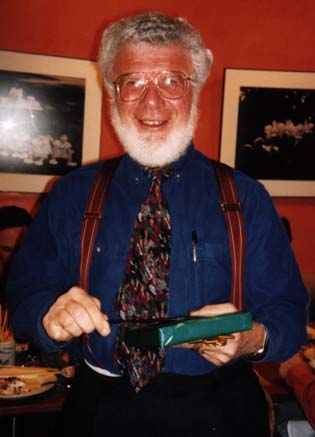Stanford University's Leonard Herzenberg wins Japan
Kyoto prize

Leonard Herzenberg
Photo courtesy Stanford
University
By Anna Molin, Bay City News Service
June 10, 2006
STANFORD (BCN) - Longtime Stanford University professor
and scientist Leonard Herzenberg has been awarded the 2006 Kyoto
Prize, Japan's equivalent of the Nobel Prize, for developing a
revolutionary cell-sorter technology in the late 1960s.
The Inamori Foundation yesterday announced the winners of the prize,
which annually recognizes people who have contributed significantly
to human progress in advanced technology, basic sciences, philosophy
and the arts.
"I'm extremely pleased and excited to receive the award,"
Herzenberg, an emeritus professor of genetics at Stanford University
School of Medicine, said in a statement. "I only wish it
were possible to be shared with my wife and lifelong colleague,
Leonore Herzenberg," who is also a genetics professor at
Stanford.
Herzenberg directed the development of the first fluorescence
activated cell sorter, or FACS, a device that can separate and
count individual cells out of trillions, allowing scientists to
analyze the particular genetics of a single cell as well as identify
bacteria.
Since its invention, the FACS machine has been constantly improved
and is now used worldwide in medical laboratories.
"It is an awfully good feeling to open almost any scientific
journal and find articles referencing the FACS technology,"
Herzenberg said.
"It's even being used to analyze plankton from the depths
of the ocean and to perform experiments on the space shuttle."
Herzenberg was first among the scientists who worked on the device
to realize its huge potential in research and medicine.
The sorter "makes sense out of chaos" and uses a technology
that separates cells through fluorescent tags applied during experiments,
according to a Stanford University statement. By divvying up rare
immune stem cells or cells that populate in diseases, such as
cancer or HIV, the sorter has made invaluable contributions to
the treatment of AIDS, cancer and other infectious diseases.
"The FACS is one of the most important medical devices ever
developed," Dean of Stanford University School of Medicine
Philip Pizzo said in a statement. "In the early 1980s, it
provided fundamental insights into the impact of HIV on the immune
system and it has been a valuable tool for diagnosing, monitoring
and treating HIV/AIDS, cancer and infectious diseases.
Professor Herzenberg is truly one of the leading innovators in
human biology of the 20th century."
Herzenberg will travel to Kyoto, Japan, in November when each
winner will receive a 20-karat gold medal and a $446,000 cash
prize from the Inamori Foundation.
Copyright © 2006 by Bay City News, Inc. -- Republication,
Rebroadcast or any other Reuse without the express written consent
of Bay City News, Inc. is prohibited.
####
|